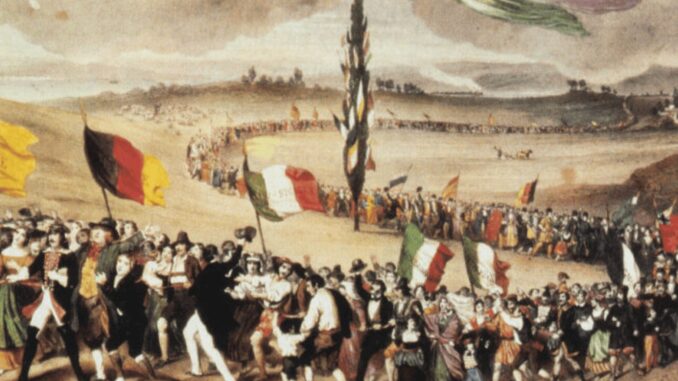
Despite the nation-state becoming the dominant political structure in the world and nationalism becoming the dominant ideology of nations, for many scholars, nationalism is often associated with aggressive policies and discrimination against non-members of a nation within a country or against members of other nations in other countries. This definition is not baseless. Two ruinous world wars and many other regional or civil wars in the last century are partly rooted in nationalism. In the meantime, ethnic nationalism, or the ideology of ethno-national movements, has become notorious and is usually considered sectarian or tribalistic. The duties of intellectuals and leaders of ã democratic nationalism, however, differ significantly from those of nation-states or dominant nationalisms. These leaders emphasise universal values and humanism while simultaneously organising their people along ethnic lines. They interpret the nationalism of their stateless nation as a legitimate fight for equality and liberty. This perspective is notable because, unlike nationalism found in nation-states, it does not claim unique or distinctive rights compared to other nations. Instead, it advocates for equal rights alongside other nations.
Historical examples from countries such as India, Spain, and even Britain demonstrate that partners can broker agreements and establish stable democracies. The potential for power-sharing and the establishment of decentralised governance in Iraq is comparatively high relative to many other multi-national states. Regarding political transformation and growing democracy, Iraq stands alongside other states that have successfully transitioned due to factors such as income, literacy levels, and a secular population, relative to its regional counterparts. The same holds for Syria, particularly its progressive Kurdish region of Rojava, which has become a model of coexistence among diverse racial, religious, and ethnic groups, serving as a haven for asylum seekers amidst turmoil in other areas of Syria.
While criticisms of the nation-state system and nationalism as sources of aggression and discrimination against outsiders and non-members is undeniable, there is differences between the nationalism of nation-states and the ethnic nationalism of ethno-national movements. The former often exacerbates human suffering, while historically, many have endured a lack of freedom and justice. Some ideologies, such as liberalism, have sought to address freedom but struggle with issues of justice. In contrast, others, like Marxism, claim to eliminate injustice, albeit at the cost of freedom, at least temporarily. In contrast, nationalism neither resolves justice nor freedom but complicates the human struggle for both. Conversely, this project contends that the nationalism of stateless nations—or ethno-nationalism- can be seen as a movement advocating for both freedom and justice. It serves as a catalyst for freedom, enabling individuals to break free from dominance while simultaneously working to reduce discrimination and injustice. If this liberal and justice-seeking ideology does not compromise the liberty and justice of other nations and does not adopt aggressive and discriminatory policies against others, it could be considered the ideology of the millennium, the reconciler of freedom and justice.
The significance of the existence or creation of such an ideology in the Middle East lies in the reality that, despite the recent decline of political Islam, it continues to pose threats from both those in power and the opposition within these countries. For example, Iran pursues its destabilisation policy under the pretext of resistance. In Iraq, Islamic Shia groups, effectively acting as pressure entities, display a formidable capacity for illicit activities, often influenced by Iran. Consequently, political Islam in the Middle East—especially in these four nations—remains a source of danger not only for themselves but also for others, all under the banner of Islamic governance and religious ideology. This persistent instability amidst a region weary from conflict and war highlights the necessity of embracing a secular leftist democratic nationalism as a pathway to coexistence, stability, and peace. It is important to note that the Kurds have not imported their ideology from the West; instead, their beliefs are not reliant on Western thinkers. Although each component—secularism, democracy, leftism, and nationalism—is rooted in the Western Renaissance, they have skillfully interwoven these elements to address their unique challenges. As an alternative to political Islam, this ideology holds the potential to be adopted by other nations, potentially forming a new identity for the Middle East, with hopes that it may inspire other countries within the Islamic world.

Be the first to comment